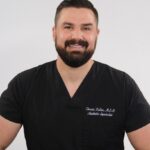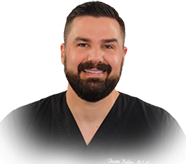
Ingrown hairs are a common skin concern that can cause discomfort, visible bumps, and, in some cases, more serious complications if left untreated. While they often appear as small, itchy bumps or “razor bumps,” the condition has a more complex explanation involving the skin’s natural barrier, hair growth cycles, and inflammatory responses. Understanding how ingrown hairs happen is the first step toward preventing and managing them effectively.
What Are Ingrown Hairs?
An ingrown hair occurs when a strand of hair grows back into the skin instead of emerging normally through the skin’s surface. In many cases, the hair curls or bends, especially in individuals with coarse or curly hair, and penetrates the surrounding skin, triggering an inflammatory reaction. The result is redness, swelling, tenderness, and sometimes the formation of pus.
Medically, ingrown hairs can be referred to as pseudofolliculitis barbae when they occur frequently in the beard or shaving area. Although most ingrown hairs are harmless, chronic ingrown hairs can lead to scarring or infection if not properly managed.
What Causes Ingrown Hairs?
Several factors can cause ingrown hairs, but most involve disruption to the natural way hair grows from its follicle:
- Hair removal methods: Shaving, waxing, plucking, and even certain hair removal creams can cause hair to grow at an angle or re-enter the skin.
- Skin buildup: A layer of dead skin cells can block the hair follicle, causing the hair to grow sideways or curl back into the skin.
- Hair type: People with coarse hair or curly hair are more prone to ingrown hairs because the natural curl pattern encourages the hair to loop back into the skin.
- Tight clothing: Friction from tight fabrics in the pubic area, neck, or legs can cause new hair to be pushed back into the skin.
Symptoms of Ingrown Hairs
You might have an ingrown hair if you notice:
- Small bumps or shave bumps that may be red or darkened
- Skin irritation or tenderness in the area
- Itchy bumps that worsen with friction
- Pus formation if bacteria enter the follicle
- In severe cases, barber bumps that appear after repeated shaving in the same area
What Happens if You Don’t Treat Ingrown Hairs?
While most ingrown hairs resolve on their own, untreated cases cause prolonged skin irritation. Some may develop into cyst-like bumps under the skin’s surface. Over time, repeated inflammation can lead to post-inflammatory hyperpigmentation (dark spots) or permanent scarring. In rare cases, a severe inflammatory reaction can lead to a deeper infection, necessitating antibiotics.
The Best Treatments to Manage Chronic Ingrown Hairs
Laser Hair Removal
Laser hair removal uses concentrated light energy to target the pigment in the hair follicle. This energy damages the follicle’s ability to produce new hair, significantly reducing hair growth over time. While results vary depending on skin and hair type, many patients experience a long-term reduction in ingrown hairs after completing a full treatment series.
Exfoliation and Chemical Peels
Chemical peels are professional exfoliation treatments that remove the outermost layer of dead skin cells. By keeping the skin’s surface clear, chemical peels help prevent new hair from becoming trapped under the skin. They can also help fade dark spots and improve the texture of skin affected by previous ingrown hairs.
At Home Topical Treatments for Dark Spots
Post-inflammatory hyperpigmentation (dark spots) often develops after repeated ingrown hairs or inflammation. Certain at-home topical treatments can help lighten these areas and even out skin tone:
- Hydroquinone: A potent skin-lightening agent that reduces pigmentation.
- Vitamin C: An antioxidant that brightens skin and supports collagen production.
- Kojic Acid: Helps inhibit melanin formation for gradual lightening of dark spots.
- Tranexamic Acid: Effective for treating stubborn pigmentation caused by inflammation or irritation.
Regular use of these topicals, combined with proper exfoliation and hair removal techniques, can help minimize dark spots and prevent them from returning.
Schedule a Consultation
If you struggle with chronic ingrown hairs, particularly in areas such as the pubic area, face, or legs, Keller Aesthetics offers advanced solutions to help you treat and prevent ingrown hairs from recurring. Our most effective options can be customized to suit your skin type and hair type, making them ideal for managing coarse or curly hair and reducing the risk of future shave bumps or barber’s bumps. Contact Travis Keller at Keller Aesthetics today to learn how laser treatment or professional exfoliation can help you enjoy smoother, clearer skin without the frustration of ingrown hairs.

Travis Keller, Medical Esthetician
Travis Keller, a board-certified medical esthetician and cosmetic laser practitioner based in Atlanta, has more than 20 years of experience specializing in advanced facial rejuvenation, cosmetic laser treatments, and non-invasive body contouring. Renowned for his precise eye for detail and compassionate approach, Travis combines cutting-edge technology with holistic and medical-grade therapies to deliver natural, transformative results. His expertise includes customized facial therapies using his signature layering technique, skin tightening, and body contouring with an array of best-in-class devices. A true innovator in aesthetic artistry, Travis continues to redefine non-surgical treatments through personalized care and exceptional outcomes that inspire lasting confidence.








